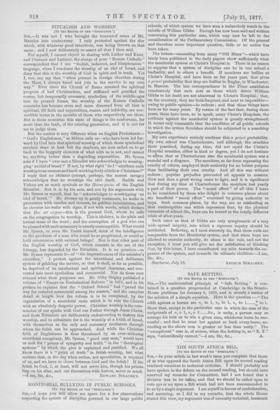MONITORIAL BULLYING IN PUBLIC SCHOOLS. ere THE EDITOR OF THE
"SPECTATOR-1 SIE,—I hope you will allow me space for a few observations respecting the system of discipline pursued in our large public
schools, of which system we have seen a melancholy result in the suicide of William Gibbs. Enough has now been said and written concerning this particular case, which may now be left to the consideration of the Parliamentary Commission. Of the general and therefore more important question, little or no notice has been taken.
The letters—emanating from many "Old Blues "—which have lately been published in the daily papers show sufficiently what the monitorial system at Christ's Hospital is. There is no reason to suppose that a system of discipline can be in one school a barbarity, and in others a benefit. If monitors are bullies at Christ's Hospital, and have been so for years past, that gives a priori probability that they are bullies in Rugby, in Winchester, in Harrow. The late correspondence in the Times establishes conclusively that such acts as those which drove William Gibbs to his death are not abnormal in Christ's Hospital; that, on the contrary, they are both frequent, and next to impossible— owing to public opinion—to redress ; and that these things have been so for many years. By reason of the fact that, during these years, there have been, so to speak, many Christ's Hospitals, the evidence against the monitorial system is greatly strengthened. It seems only reasonable that the condition of all public schools in which the system flourishes should be subjected to a searching investigation.
My own experience entirely confirms this a priori probability. My own school was Charterhouse, and although the cruelties there practised, during my time, did not equal the Christ's Hospital cruelties, either in kind or degree, yet I do not hesitate to affirm that at Charterhouse also the monitorial system was a scandal and a disgrace. The monitors, so far from repressing the cruelty of others, employed their authority for no better purpose than facilitating their own cruelty. And all this was without redress ; popular prejudice prevented all appeals to masters. Now and then a great wrong came to light, and it is significant that during my time at Charterhouse the monitors lost yearly a part of their power. The "moral effect" of all this I leave to be considered by those who delight in common-places about the beneficial "moral effect" exercised by giving authority to boys. Such common-places, by the way, are as misleading as that contemptible one which represents that, by the physical torments of school-life, boys can be inured to the totally different trials of after-years.
Such cases as that of Gibbs are only symptomatic of a very wide-spread iniquity, into which a rigorous inquiry should be instituted. Believing, as I most sincerely do, that these evils are inseparable from the Monitorial system, and that when boys are allowed to exercise authority, its abuse is the rule, and not the exception, I trust you will give me the satisfaction of thinking that, by this letter, I have contributed my mite towards the ex- posure of the system, and towards its ultimate abolition.—I am, Sir, &c,,






























 Previous page
Previous page